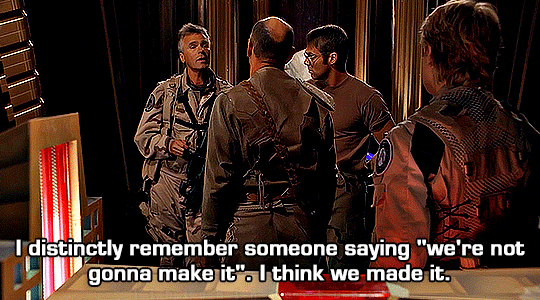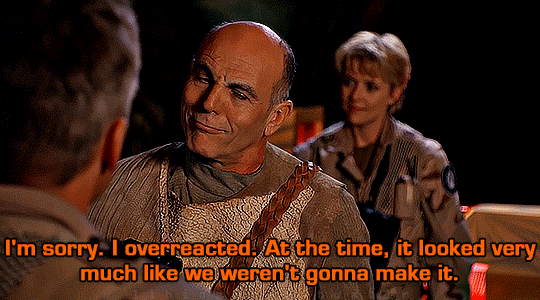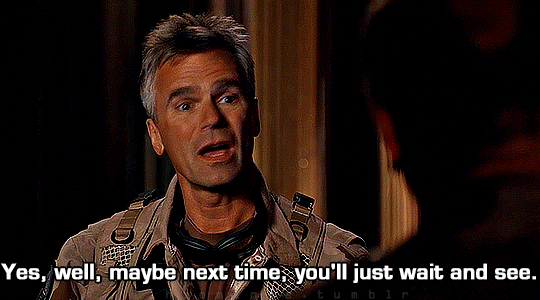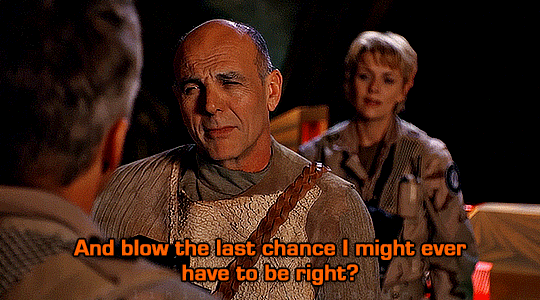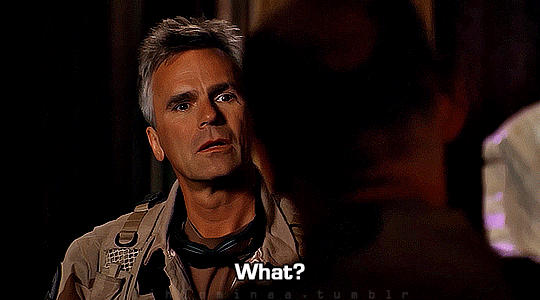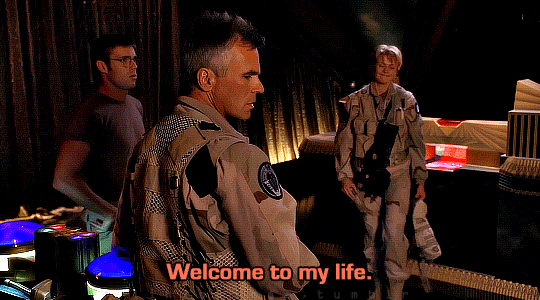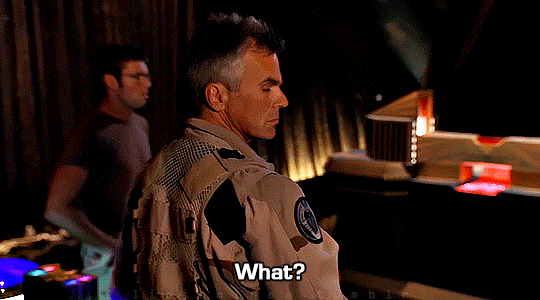Text



Some actual mental health advice and raising of mental health awareness.
...because "you're the only one who has the power to lift that rock off your chest [by forgiving your abuser]" is a dangerous sentence.
#amanda tapping#also if you don't know what this post has to do with Amanda#that sentence is from her#incited by the companion#was she thinking about actual abusers when she said that?#maybe not#but this is supposed to be a project about mental health#guess who struggles with mental health#people who have been abused#people with PTSD and cPTSD
1 note
·
View note
Text
Embracing Mental Health?
Looking At The Companion’s Approach
I want to write about The Companion's focus on mental health and their related projects.
When The Companion first announced their book, several of my friends and I had mixed feelings. While the project had the potential to help many, it also had the capacity to cause harm, and we weren't sure which way it would go, since The Companion had not proven to be a safe space by then. By now, these initial concerns have not only been confirmed but have even surpassed our expectations in a negative way, sadly.
It’s clear that the people at The Companion never have experienced a certain... form of mental health struggle, because if they had, they would be well be aware of the issues and dangers that come with the way they are handling the project, and they would therefore be talking and acting differently. To some degree that’s a good thing, as I wouldn’t wish my worst enemy to have the experiences I had and am having, the experiences that part of my fandom friends have, the experiences that a lot of traumatised people go through. However, there are people who – as far as I’m aware – aren’t struggling with mental health themselves and still have voiced the same concerns, showing that it's possible to recognize the problems with The Companion's approach without having experienced severe mental health struggles firsthand.
The Companion is months into lauding themselves of promoting mental health awareness, yet they haven’t been consulting professionals. This is apparent in their lack of adherence to trauma-informed practices. I won't delve into the principles of trauma-informed practice, such as safety, trustworthiness, choice, collaboration, and empowerment, or the topic of trauma and its consequences as that would go beyond the scope of this text and you can look that up. These principles are however essential for handling sensitive topics like mental health.
When The Companion announced the book, our primary concern was the safety of the submission process. What would they do to ensure us that submitting stories would be safe, to show us they are trustworthy? How would they handle the story selection transparently? How would they support those, whose stories were not chosen, to minimize the risk of flashbacks, mental breakdowns, or re-traumatization due to rejection? The answer has become clear: they won’t. They have not made any effort to assure contributors that their stories will be handled safely and respectfully. Instead, they have set numerous guidelines for what “they’re looking for”, what constitutes a “good” story, turning it into a writing contest. If your story isn’t chosen, it seems it’s your fault for being a bad writer. They also disregard dyslexic individuals or non-native English speakers, as submissions with “typos and grammatical errors” might also be rejected. They aren’t just not providing information on how they will handle rejections in a trauma-informed manner but placing the burden of rejection squarely on the writer. Their message is essentially: “Be vulnerable, be open, be emotional, but if this process or the rejection leads to mental health issues and triggers you, that’s not our problem, it’s not even something we’ll address in any way because it doesn’t even cross our minds that it could be a problem.”
Safety is among other things fostered through giving information and thereby the chance to mentally prepare oneself, to know what to expect – what’s going to happen, when and how. Give me as much control about the process as possible. However, the submission process lacks more information. When submitting, contributors agree that their stories can be used in “any other project and format,” which is such an unclear wording that it offers no reassurance at all that I will have control over how my story will be used once I submit it. There is no information on if and how a submitted story can be edited. And there’s the info that the submission can be withdrawn but not a clear deadline. The fact that they’re not publishing all questions at once, while to some degree understandable, goes again against the principle of providing control and safety. If I know what all the questions are that gives me the option to calmly decide for which question my story would fit best.
Of course, an easy dismissal could be, “If you’re too unstable to submit stories, don’t participate,” but considering this is all about embracing mental health, such a stance would be cynical.
Beyond the submission process, there have been other red flags throughout the project. Starting with the price: $99. For that amount, I can buy three handmade quiet activity books for children, which literally take hours to make. It’s hard to believe the printing of one single book costs $99, and hard to believe one could set a price before having any content ready. Transparency about the cost would help, and no, vague descriptions like "little details," "holes in the cover," or "a thread" do not count as transparency. I can buy an awl for $4 and make my own holes, and a piece of thread costs less than $1. These titbits of information do not explain the cost. We are unable to imagine what could justify the cost but even if we assume the book actually costs $99 to print, this price makes it unaffordable for those most in need. If the price is not something that makes you think, you likely can afford therapy well. You are privileged. Still, how can you not see that the price is an issue for others and that a book about/for mental health should never cost that much? I can get books by actual professionals like Bessel van der Kolk or Bruce Perry for a fraction of that price. Also, what about the Kickstarter? A Kickstarter to pre-order books and to cover all additional expenses for design and whatnot would’ve made sense. Yet not only is it unclear what a Kickstarter is needed for now, it also was originally announced to be starting at Basingstoke and without any information it just got postponed. I repeat: Creating safety by giving information would be the trauma-informed approach but that’s not happening.
“But it will be available for free online!” All the promotional focus has been on the physical book's aesthetics, how good it will feel in your hands, how shiny it will look, how many details it will have. Those struggling with mental health and financial instability won’t get that tactile experience. So... is it more important for the book to look as fancy as possible or to be affordable and accessible to those who truly need it? The Companion’s priorities seem clear: appearance over accessibility. After all, it’s all they’ve focused on during the promotion: “This is how good the book will look” instead of “Here’s how we will make the story collection process safe for you,” which – again – is what most actually traumatised people actually wanted to know. The priorities are... weird. Making the book less shiny to make it more affordable doesn’t seem to be an option and by that, they fail the goal of supporting people struggling with mental health, in my opinion.
In fact, throughout this whole process, there has been so much focus on the marketing part and hardly any on the ‘embracing mental health’ part, outside of the interviews. Most recent example from the pin campaign: The email I just received, “Pledge until midnight to get these freebies.” But also other examples from the book, like the fact that the pre-orders had a limited number. “Give a sense of urgency and scarcity to get people to buy quickly” is a marketing strategy that, in my opinion, has no place in a project that is about mental health, where people need time to make decisions, where people need time to save money, where people don’t need to be put under additional stress, and where people might take time-outs of social media and newsletters for mental health reasons. Another focus has been counting numbers. “Let’s get xxx subscribers! Let’s get xxx people to join the waiting list!” Again, a potentially fun way to promote a project or a company. Yet again, focusing so much on such a superficial thing instead of a trauma-informed approach and instead of, say, a discussion about how to support people struggling on social media, makes the priorities weird again. ...because throughout the months I’ve seen various people writing about being at a low point in terms of mental health, in reply to posts by The Companion, and the supposedly so supportive fandom didn’t react.
What even does “embracing mental health as a fandom” mean, outside of the interviews? The Social Hour chats? The Companion did a good job at showing right away that this was not a safe space for me, by starting with the question of “What smell reminds you of childhood?” and expecting nice, fluffy answers. My answer is “vomit” and it’s not memories I want to talk about, nor do I want to listen to other people’s nice, fluffy childhood memories. That question made it clear right away: Not well-suited for people with cPTSD.
The 60 for 60 challenge to get people thinking about things? The first post I saw was the question “What if you were forced to do a do-over, how would you relive your life in 2024 as a 15-year-old?” and my first thought was, “if I had to relive my life as a 15-year-old in the situation that I was in as a 15-year-old but with the knowledge I have now, I wouldn’t. I’d off myself.” And that thought was immediately followed by anxiety and flashbacks. Only on a second look at the post did I see that it didn’t specifically state that it would have to be the same situation that the person was in as a 15-year-old, but then, that quickly also made me want to ignore that challenge.
Positivity chitchat? Positivity is good. Looking for glimmers is good. Toxic positivity isn’t. The focus on post-traumatic growth, a concept that hasn’t actually been properly validated by research, isn’t. Yet this is what The Companion aimed at with their questions for the green room sessions not once but twice: “The last few years have been really tough for many of us and our lives have changed. What’s one way your life has changed for the better you’d like to share with the group?” “Reflecting on the challenges you've faced, what's one positive insight or lesson you've gained that you'd like to share with others?” A friend commented that they’d dare The Companion people to ask Amanda with a straight face what positive insight she gained from experiencing eight miscarriages. The questions can be answered if your mental health struggles aren’t related to trauma or if they don’t go beyond a certain depth of struggle. Together with the financial situation, the target group of this project seems to be people with good income who struggle with life challenges such as the death or sickness of loved ones, bullying at work, etc. All very serious issues and things that are bound to have a negative impact on mental health. That’s just one subgroup of people struggling with mental health, though. And I’m not saying that there aren’t people with PTSD and cPTSD who have benefited from what The Companion is doing, I’m sure there are. I'm also not expecting The Companion to be a trigger-free space – that's impossible given the different life experiences of people. However, having a professional supervising the process and adherence to trauma-informed principles is not too much to ask.
The middle-term consequences? While I'm speaking primarily from my own experience, some friends share similar concerns. The middle-term consequence is that what comes with these projects is an additional stress factor for conventions, it makes me feel additionally unsafe. I can unsubscribe from The Companion’s newsletter, avoid their social media and just not keep track of these projects anymore. I have however been going to Stargate conventions and conventions with Amanda regularly. I ended up struggling with additional anxiety after The Companion’s panel at Basingstoke. I’ve skipped the last two conventions in the USA despite having the time and money to attend. The heavy presence of people who are clearly not trauma-informed and the fact that I can identify them by their T-shirts and hoodies, makes me feel unsafe. If you actively support a company that's selling a book that’s aimed at mental health and costs $99, I don’t trust you.
For the moment, I’m not sure what that means when it comes to Amanda. I owe her so much. I’m not sure if I would be here if it hadn’t been for her kindness and care. I appreciate and respect her deeply and am immensely grateful. Yet, I struggle to understand how she’d support a $99 book and that makes feel disconnected from her, too, even if I don't doubt the good intentions, and I know of others who are feeling similary. I don’t know what this will mean, moving forward. The thought of the potential loss of one safe person and one safe space is stressful.
In addition to the impact on conventions, there’s the danger of people feeling once again (and by ‘once again’ I mean given their traumatic past experiences) excluded. The message seems to be: “You’re not alone. But no, not like that. If you’re not stable enough, here’s a list with professionals. You don’t get to be part of this clique because we’re not going to care about being trauma-informed and a safe space. You’re too broken for our group.” (On a side note, I find it interesting that none of us can connect to the whole hype around the enamel pins. If I were to wear a mood pin, I’d choose something simpler like the Mood Tracker by AtelierEumori. However I very probably wouldn’t tell strangers my mental health state to start with as it would feel unsafe and with safe friends I would talk directly if needed, so I wouldn’t use a pin to start with, but then different people have different preferences. If the pins by The Companion help even one person that’s good.)
So, for me and some of my friends, The Companion’s approach not only fails to support a subgroup of people struggling with mental health but actively contributes to further distress.
“You’re just a hater, looking for something to complain about.”
I don’t actively participate in social media; I primarily use it to stay up to date with news from the pages I follow. I have, however, seen some public criticism directed at The Companion. It’s notable that this criticism is often met with dismissal or even attacks from The Companion’s followers, while The Companion itself remains silent. Outside of a form after the initial interview with Amanda, there hasn’t been an option to provide anonymous feedback, nor has The Companion created a safe enough space for non-anonymous feedback to be feasible. I know of persons who have refrained from voicing the points, the critique I’m discussing here because they fear hateful responses. This is particularly problematic because a key feature of trauma is the experience of being silenced. Personally, I wasn’t allowed to voice or even have an opinion as a child and teen, as daring to voice any protest would immediately result in additional abuse. This situation presents again a risk for re-traumatization and further marginalizes those already struggling with their mental health. The silence that comes from people not daring to speak up leads to a sense of “I’m overreacting, I must be a bad person.” Déjà-vu. Only once I started speaking with others I noticed that I’m not at all alone with these concerns, that I’m not the only person who’s experiencing a negative impact on their mental health from what The Companion is doing. The aim of this post is not to get The Companion to change, the damage is done. The aim is to make others who might feel alone with these thoughts feel less alone.
Edit: It's 'you should forgive your abuser' now. I’m speechless… Just a quick reminder for all survivors out there: No, you don’t need to forgive to heal.
3 notes
·
View notes
Text








Stargate Atlantis: Be All My Sins Remember’d
186 notes
·
View notes
Text








Tai watches Stargate
Stargate SG-1
3x11 - Past and Present
110 notes
·
View notes
Text
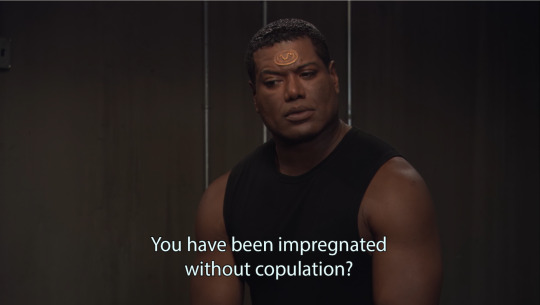
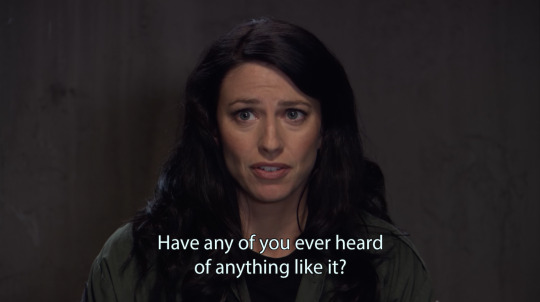
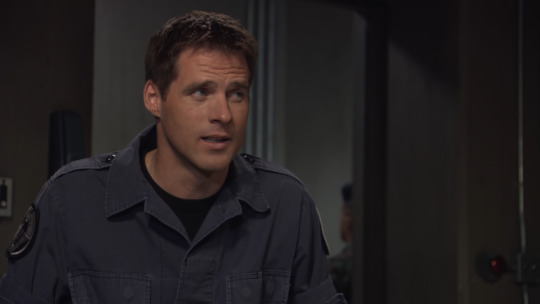


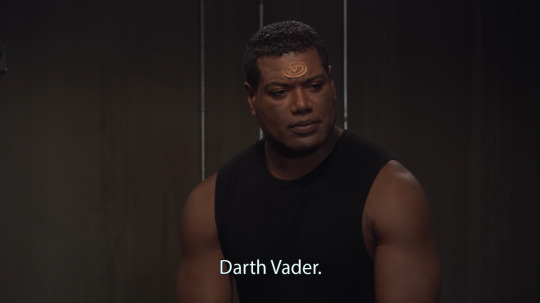
Pretty sure Teal'c considers Star Wars a documentary of sorts.
11K notes
·
View notes
Text

we also have a carter who is trying to figure out what alien device is turning them all into plushies


she comes with a tablet too!!
24 notes
·
View notes
Text
Hammond: That’s a crazy idea. Insane. It doesn’t make sense.
Jack: You’ll let us do it?
Hammond: Of course.
227 notes
·
View notes
Text
Sometimes I wish this fandom was more active...
...and then I remember the fandom drama and am glad it isn’t...
7 notes
·
View notes
Text
I wish everyone going to Gabit a great time.
In particular I hope that all the newbies have a wonderful experience.
#Amanda Tapping#I wish I could see Amanda this weekend#but given the circumstances of Gabit cons I know I wouldn't enjoy it#I do hope she and Suanne have a lovely weekend
2 notes
·
View notes
Photo

Gabit & Gabiteers after GateCon dared to make updates to their event around the time the tickets for ATX went online: GateCon ist trying to make fans decide between conventions! GateCon is EVIL!!!!!
(GateCon was happening on a whole different weekend, a whole different month.)
Also Gabit:
Sets the date for Inspirations: 2022 on the same date as GateCon‘s convention.
------------------------------
Do I believe them when they say that they had good reasons for choosing that same weekend? Yes, I don’t believe that the date was chosen in order to harm GateCon. Even if it means that Amanda and Suanne won’t be able to attend GateCon, despite them celebrating the 25 anniversary!
I also believe that GateCon had good reasons for updating their event when they did and that it had nothing to do with wanting to harm Gabit conventions. It’s only a pity that “the Gabit way” is such a spiteful, hateful way.
Btw, I erased the names for them not to be a distraction but the post is fully public and accessible on Facebook even to people who don’t have Facebook.
1 note
·
View note
Photo
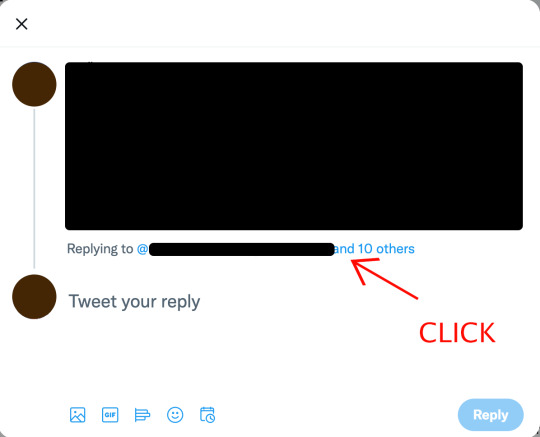
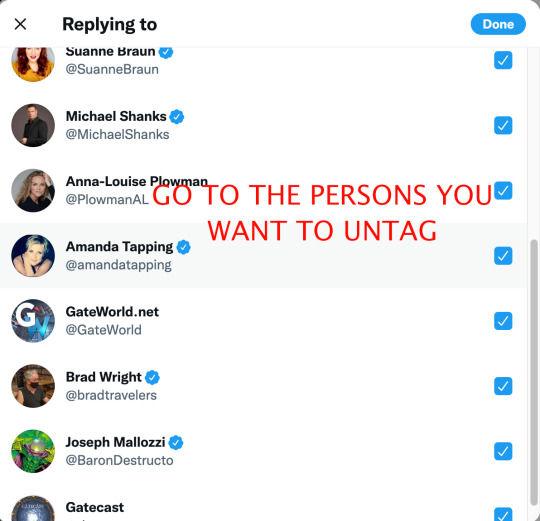

How to untag persons and avoid spamming actors with 100+ tweets unrelated to them or their characters in less than 24h.
It’s no rocket science.
#Amanda Tapping#at fandom#psa#sigh#I mean stop tagging a dozen of people in general when you write a tweet#but if you can't manage that at least think about whom your reply is addressing and untag accordingly
2 notes
·
View notes
Text
135 mentions in 7 days
...okay, give or take, I didn’t do a fully exact count but around 135 mentions in seven days...
...out of which around 5 are actually tweets *to* Amanda instead of tweets mentioning her because you happen to tweet something about Stargate and oh why not tag her since she happened to be in the show?
...I’m guessing that this is the average at the moment but that there have been times where that number was much higher. (Edit: 100 more in the 21 hours since I wrote this post. This is bs.)
...and then people are annoyed because once they actually tweet something *to* her, with the intention of actually wanting to *tell* *her* something, it gets lost among the many tweets.
Do you need to tag her in every photo she’s in, in every video she’s in, in every mention about how you’re watching Stargate, in every Stargate-promoting tweet or hashtag campaign? Do you need to keep her tagged when you reply to such a tweet, with an answer that is not at all related to her, and often not even to her character? Really?
I have no clue if her interaction with fans on twitter would actually increase if she wasn’t spammed with tweets, daily, but I think that chances would be higher if she actually only got @ when the person tweeting actually wanted to talk *to her* instead of *about her*.
1 note
·
View note
















